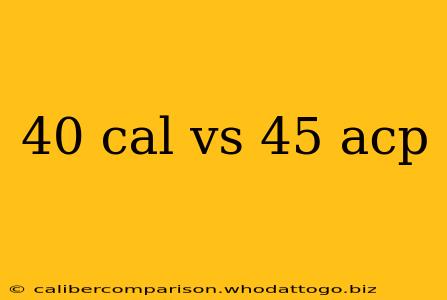Choosing the right caliber for self-defense or concealed carry is a crucial decision, often sparking heated debates among firearm enthusiasts. Two popular choices frequently compared are the .40 Smith & Wesson (.40 S&W) and the .45 Automatic Colt Pistol (.45 ACP). This in-depth comparison will analyze both calibers across key factors, helping you make an informed decision based on your individual needs and preferences.
Ballistics: Power and Penetration
The core difference lies in their ballistic properties. The .45 ACP boasts a significantly larger diameter bullet (typically .452 inches) compared to the .40 S&W (.401 inches). This larger diameter translates to a larger wound cavity, potentially leading to more immediate incapacitation. However, the .40 S&W generally exhibits higher velocity, resulting in flatter trajectories and increased penetration.
.45 ACP Advantages:
- Stopping Power: The larger diameter and heavier bullets generally deliver greater stopping power due to the increased temporary cavitation.
- Energy Transfer: More energy is transferred to the target upon impact, potentially leading to faster incapacitation.
.40 S&W Advantages:
- Velocity & Penetration: Higher muzzle velocity provides better penetration through barriers like clothing or car windshields.
- Capacity: Many .40 S&W handguns offer higher magazine capacities compared to their .45 ACP counterparts.
Recoil and Shootability
Recoil is a critical factor influencing accuracy and comfort, especially for smaller-framed shooters or those new to firearms. The .40 S&W is generally considered to have sharper recoil than the .45 ACP. While the .45 ACP's recoil is heavier, it's often described as a "softer" push, making follow-up shots easier for some individuals.
.45 ACP Advantages:
- Recoil Management: For many, the heavier but smoother recoil of the .45 ACP is easier to manage and control.
.40 S&W Disadvantages:
- Recoil: The sharper recoil can be challenging for some shooters, potentially affecting accuracy.
Concealed Carry Considerations
Both calibers are suitable for concealed carry, but the choice depends on individual preferences and physical capabilities. The higher capacity of some .40 S&W pistols can be advantageous, but the heavier recoil might be a drawback for smaller individuals. The .45 ACP's heavier recoil might necessitate more rigorous practice to maintain accuracy.
.40 S&W Advantages:
- Higher Capacity Options: More rounds available before reloading can be a significant advantage in self-defense situations.
.45 ACP Advantages:
- Reduced felt recoil (for some): While the recoil is heavier overall, the nature of the recoil can feel more manageable than the snappier .40 S&W for some shooters.
Ammunition Availability and Cost
Both calibers enjoy widespread availability, but the .40 S&W might have a slight edge in terms of cost, particularly for practice ammunition. However, price fluctuations are common, so it's always best to check current market rates.
Conclusion: The Best Caliber for You
Ultimately, the "better" caliber— .40 S&W or .45 ACP—depends entirely on your individual needs and shooting capabilities. Consider factors like your physical build, shooting experience, intended use (self-defense, concealed carry, etc.), and personal preference when making your decision. Extensive range time with both calibers is highly recommended before making a final commitment. Consult with experienced firearm instructors and professionals for personalized guidance. Remember, responsible gun ownership and proper training are paramount.

